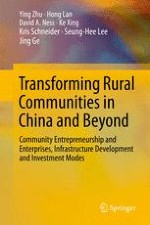2015 | OriginalPaper | Buchkapitel
5. Alternative Energy Development in Rural Chinese Communities
verfasst von : Ying Zhu, Hong Lan, David A. Ness, Ke Xing, Kris Schneider, Seung-Hee Lee, Jing Ge
Erschienen in: Transforming Rural Communities in China and Beyond
Aktivieren Sie unsere intelligente Suche, um passende Fachinhalte oder Patente zu finden.
Wählen Sie Textabschnitte aus um mit Künstlicher Intelligenz passenden Patente zu finden. powered by
Markieren Sie Textabschnitte, um KI-gestützt weitere passende Inhalte zu finden. powered by
